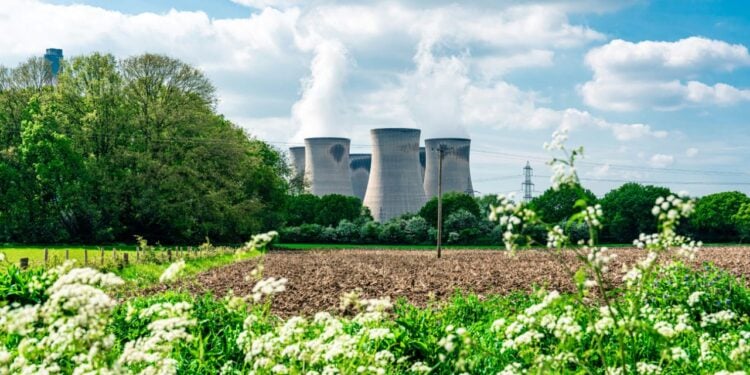- Fusion energy is set to create over 1 million jobs by 2040, spanning roles in engineering, science, policy, and infrastructure, significantly shifting the energy sector and job market.
- As the demand for specialized skills grows, fusion will require experts in physics, engineering, and AI, with an emphasis on multidisciplinary roles to adapt to evolving technologies.
- Fusion energy will drive economic growth, creating “green collar” jobs and boosting global job creation, while also emphasizing the need for training and upskilling.
Exciting changes are on the horizon for the energy world — and the workforce as a whole. According to Ignition Research, we could see over 1 million jobs in nuclear fusion energy by 2040.
For context, nuclear energy has two types: fission and fusion, of which fusion has not yet been successfully developed. But scientists are working hard to make it happen, and for good reason: it’s abundant, carbon-free, and safe.
So, what does this mean for the future of work, the types of jobs people will have, and how businesses and workers will adapt?
Fusion Energy Will Be The Next Big Job Creator
Fusion energy is nearing its alleged 2030s achievement goal, and it’s becoming a serious contender in the quest for sustainable, virtually unlimited energy. As this technology progresses, it’s going to create a ton of new jobs — to the tune of over 1 million by 2040. If this prediction pans out, we’re looking at a major shift in the energy sector, but also in the types of jobs that will exist.
Roles from engineers and scientists to jobs in project management, infrastructure, and even energy policy will hit the job market.
With the advent of AI, data centers need to quickly expand — but there aren’t enough resources or power for the amount of data we will be using in the future. This has made the public eye turn to fusion even more as a solution for abundant power.
As countries and companies pour resources into fusion research and development, the demand for skilled workers will skyrocket.
Skills for the Future: What Will People Be Doing?
Nuclear energy is quite complicated, and requires extremely intelligent workers with very specialized skills.
Fusion physicists, engineers with expertise in nuclear technology, and data scientists who can manage the complex systems will be part of the 1,000,000 jobs created. People entering the field will need to have strong technical skills, but just as importantly, they’ll need the ability to adapt quickly as the tech progresses.
This also means we’ll see more multidisciplinary roles, blending skills from fields like AI, robotics, and environmental science. If you’re a techie with an interest in energy or someone who loves solving big problems, fusion could be the career move for you.
The Rise of Sustainable Careers
As the world moves toward cleaner energy sources, fusion energy will help to grow “green collar jobs,” which are roles that focus on sustainability and environmental impact, and they can extend to everything from manufacturing to policy-making.
Fusion would create research jobs in labs, as well as fuel job growth in renewable energy infrastructure, maintenance, supply chains, and more.
Remote Work in the Fusion World?
Another interesting piece to consider: Many of these fusion-related jobs could be remote.
With the rise of digital tools and global collaboration, more and more jobs in tech, project management, and even consultancy roles can be done virtually. So while there will certainly be a need for hands-on roles (working at fusion plants), admin roles, engineering consultations, and even policy work could take place from pretty much anywhere.
The Future of Work, Powered by Fusion
Simply put, fusion energy is shaping up to be one of the biggest job creators of the next couple of decades. Aside from the benefit of having clean energy, nuclear fusion technology would build an entire ecosystem of sustainable careers in a fast-progressing, tech-driven world.
In addition to creating a diverse array of new job roles, fusion energy has the potential to drive significant economic growth and workforce development in regions embracing this technology.
According to the International Renewable Energy Agency, transitioning to renewable and clean energy sources could create up to 85 million jobs globally by 2030. Fusion energy, as a major component of this transition, will likely play a key role in this transformation.
As fusion power plants are built and scaled up, workers will be needed not only to construct and operate these plants, but also to maintain the complex systems involved. This could create a wave of job creation in both developed and emerging economies, potentially reducing unemployment rates in areas with a heavy focus on industrial jobs as well as tech roles.
With job creation spanning from energy production to policy-making and global supply chains, fusion energy presents an opportunity for workers to engage in meaningful, long-term careers.
For now, the growth of fusion technology will require robust training systems and support for workers transitioning into these specialized roles, ensuring that the workforce is equipped to meet the challenges of a sustainable energy future.



 Dr. Gleb Tsipursky – The Office Whisperer
Dr. Gleb Tsipursky – The Office Whisperer Nirit Cohen – WorkFutures
Nirit Cohen – WorkFutures Angela Howard – Culture Expert
Angela Howard – Culture Expert Drew Jones – Design & Innovation
Drew Jones – Design & Innovation Jonathan Price – CRE & Flex Expert
Jonathan Price – CRE & Flex Expert













